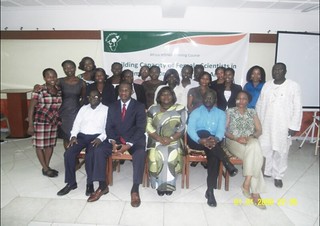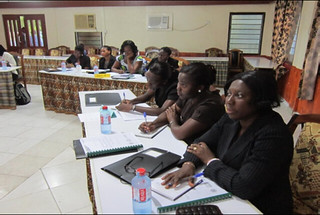Africa RISING helps female scientists improve knowledge on experimental design and data analysis in Ghana

The United States Agency for International Development (USAID)-funded Africa Research in Sustainable Intensification for the Next Generation (Africa RISING) research-for-development project in West Africa, which is led by the International Institute of Tropical Agriculture (IITA), partnered with Ghana’s Council for Scientific and Industrial Research (CSIR) to organize a short course in June 2013 for 15 female scientists. The scientists, drawn from 12 CSIR research institutions and universities in Ghana, participated in a two-week workshop on experimental design and data analysis.
The workshop was designed to help address the inefficiencies in research data analysis and interpretation and presentation of results. The timing of the training was critical, as it came immediately following a recent survey that revealed that over 90% of researchers had difficulty writing up their research for publication. The survey, conducted by the Netherlands-based Technical Centre for Agricultural and Rural Cooperation (CTA) in sub-Saharan Africa, also showed that 40% of manuscripts submitted for publication in journals are rejected.

Opening the workshop, the director general of CSIR, Abdulai Salifu, emphasized the importance of quality research publications for the benefit of the scientific community and the public. He urged participants to make the best of the workshop to improve their research output. The Deputy Director General of CSIR, Rose Emma Mamaa Entsuah-Mensah, who chaired the function, praised the workshop’s focus on female scientists saying it would help ‘promote Ghanaian female scientists.’
The Africa RISING West Africa chief scientist and country representative of IITA in Ghana, Asamoah Larbi, asked the participants to pay particular attention to proper research design and data analysis to ensure the scientific quality of their research. Participants said the course would help them address difficulties encountered in data collection, analysis and presentation of results. ‘The knowledge gained from this course will help me to carry out experiments and interpret and share outputs with relevant stakeholders,’ one participant said.
As part of the US Government’s Feed the Future initiative aimed at addressing global hunger and food security, USAID is supporting multi-stakeholder agricultural research projects. Such projects are providing support to vulnerable women, children and family members – mostly smallholder farmers – to escape hunger and poverty.
Written by Asamoah Larbi (IITA).




